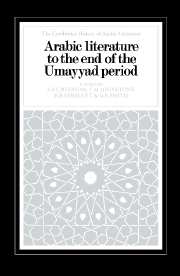Book contents
- Frontmatter
- Contents
- Editorial introduction
- 1 The tribes of pre-Islamic Arabia
- 2 The Umayyad Empire, c. A.D. 750
- 1 Background topics
- 2 Pre-Islamic poetry
- 3 Early Arabic prose
- 4 The beginnings of Arabic prose literature: the epistolary genre
- 5 The role of parallelism in Arabic prose
- 6 The Qur'ān-I
- 7 The Qur'ān–II
- 8 Qiṣaṣ elements in the Qur'ān
- 9 Aspects of the Qur'ān today
- 10 Ḥadīth literature–I: The development of the science of Ḥadīth
- 11 Ḥadīth literature-II: Collection and transmission of Ḥadīth
- 12 Shī'ī Ḥadīth
- 13 Narrative elements in the Ḥadīth literature
- 14 European criticism of Ḥadīth literature
- 15 The impact of the Qur'ān and Ḥadīth on medieval Arabic literature
- 16 The Maghāzī literature
- 17 The Sīrah literature
- 18 The poetry of the Sīrah literature
- 19 Fables and legends in pre-Islamic and early Islamic times
- 20 Umayyad poetry
- 21 Music and verse
- 22 The Greek impact on Arabic literature
- 23 The Persian impact on Arabic literature
- 24 The Syrian impact on Arabic literature
- Appendix Bibliography of translations of the Qur'ān into European languages
- Glossary
- List of sources
- Index
9 - Aspects of the Qur'ān today
Published online by Cambridge University Press: 28 May 2012
- Frontmatter
- Contents
- Editorial introduction
- 1 The tribes of pre-Islamic Arabia
- 2 The Umayyad Empire, c. A.D. 750
- 1 Background topics
- 2 Pre-Islamic poetry
- 3 Early Arabic prose
- 4 The beginnings of Arabic prose literature: the epistolary genre
- 5 The role of parallelism in Arabic prose
- 6 The Qur'ān-I
- 7 The Qur'ān–II
- 8 Qiṣaṣ elements in the Qur'ān
- 9 Aspects of the Qur'ān today
- 10 Ḥadīth literature–I: The development of the science of Ḥadīth
- 11 Ḥadīth literature-II: Collection and transmission of Ḥadīth
- 12 Shī'ī Ḥadīth
- 13 Narrative elements in the Ḥadīth literature
- 14 European criticism of Ḥadīth literature
- 15 The impact of the Qur'ān and Ḥadīth on medieval Arabic literature
- 16 The Maghāzī literature
- 17 The Sīrah literature
- 18 The poetry of the Sīrah literature
- 19 Fables and legends in pre-Islamic and early Islamic times
- 20 Umayyad poetry
- 21 Music and verse
- 22 The Greek impact on Arabic literature
- 23 The Persian impact on Arabic literature
- 24 The Syrian impact on Arabic literature
- Appendix Bibliography of translations of the Qur'ān into European languages
- Glossary
- List of sources
- Index
Summary
At the present time, the influence of the Qur'ān on Arabic literature is unobtrusive, yet at the same time considerable. It is unobtrusive because no Arab writer would think of reproducing the style of the Qur'ān, even though for many it remains their most important model. It must be concluded that the dogma of i‘jāz explains such an attitude: one cannot imitate the Qur'ān. In this respect it can be said that most modern novels and poems in free verse, not to mention scientific treatises, are closer to similar Western works than to the sacred book of Islam.
However, the influence of the Qur'ān on Arabic literature remains considerable. Through the ideas it contains, it acts as a guiding light and as a code of faith and knowledge in the whole area of religious works. Its supremacy, where form is concerned, is manifested by the delight of authors in alluding frequently to the Qur'ān and in quoting liberally from its verses in their writings.
The fact that social life in the Islamic world and the personal life of much of the population is so profoundly affected by the Qur'ān is clearly reflected in literature. How can one describe everyday life, be it in reality or in fiction, how can one approach legal, moral or theological problems without being obliged to look for support in the Qur'ān? Even those who claim non-religious or anti-religious tendencies cannot escape its supremacy, in that they quote it or refer to it in order to challenge it.
- Type
- Chapter
- Information
- Arabic Literature to the End of the Umayyad Period , pp. 260 - 270Publisher: Cambridge University PressPrint publication year: 1983



